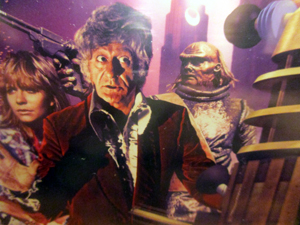Day of the Daleks
“There are many different kinds of ghosts, Jo. Ghosts from the past—and ghosts from the future.” – The Doctor
This was one of my childhood introductions to the fascinating idea of a time travel paradox. The central concept of the entire story is that, in trying to change their history by killing the man they think starts World War III, the future guerillas actually create that very future. What I didn’t realize until this viewing are the number of other time paradoxes within it. The Daleks, for example, are able to take control of earth simply because it is weakened by the war the guerrillas accidently start in setting off the bomb. Yet it’s the Dalek’s time technology which they bring with them in their invasion that actually ends up allowing the rebels to take the bomb back in time and set it off. What’s more, the Daleks travel back in time after them to make sure that this history remains in place (somehow they know the real cause of Styles death though everyone on Earth doesn’t) but are instead killed when the bomb goes off—and yet this means the event that brought them to earth (along with the bomb that kills them) never happened! As the Doctor tells Jo early in the story, “It’s a very complicated thing – time, Jo. Once you’ve begun tampering with it, the oddest things start happening.”
Despite this fun bit of storyline which makes me see this story through rose-tinted glasses, it is actually famously (and I have to admit justifiably) dismissed for rather stilted acting, lackluster action, and bad direction and editing—so bad that they tried to “correct” the scene of the attack on the country house by the Ogrons and Daleks on the DVD with a recut to make it more palatable for new fans. After their long absence from the show, it seems the producers forgot how to present the Daleks to make them menacing or even how to get their voices right. There are some overly quick arcs of change in characters, jumping between from evil to sympathetic too abruptly, as well as some rather silly oversight (if UNIT searched the whole building how did they not see Jo and the Doctor tied up right there at the bottom of the stairs?).
There are other merits to the story of course—the apelike Ogron mercenaries are a unique though ultimately underused addition to the pantheon of Who monsters and the actress who plays Anat does a good job in showing both a face of desperation and the resolve of a hardened rebel. The Brigadier gets to do a lot of good shouting and commanding (telling off Styles at one point) in the story but what really stood out to me about him this time was how, when the Doctor takes off with his jeep and ignores his order to come back at once, the camera shows a close up of the Brigadier not with anger on his face but a slightly rye smile. He really does trust and care for the Doctor! (I’ve noticed the same thing on a lot of these early stories—Nick Courtney did a great job in this season of not making the Brigadier a fussbudget boss but rather a friend.) There’s also some great discussion between the Doctor and Jo and the Controller like when the Doctor undercuts his every smokescreen and attempt to white-wash the true nature of his authoritarian rule. (“When I meet a regime that needs to import savage alien life-forms as security guards, I begin to wonder who the real criminals are.”)
Best (or worst) unsettling moment:
“Nobody who did not live through those terrible years can understand. Towards the end of the twentieth century, a series of wars broke out. There was a hundred years of nothing but killing, destruction. Seven-eighths of the world’s population was wiped out. The rest were living in holes in the ground, starving – reduced to the level of animals.”
Firsts:
- Ogrons!
- Mention of the Blinovitch Limitation Effect
Retrofit:
“The Daleks have discovered the secret of time travel. We have invaded Earth again. We have changed the pattern of history…The Dalek empire will spread through all planets and all times. No one can withstand the power of the Daleks!” This is one of the earliest true examples that we point to of the Daleks trying to conquer across all time, perhaps the start of the great Time War. It’s an interesting re-write of their history (invading the world far earlier than what we see in The Dalek Invasion of Earth) that then is presumably erased and set right again.
Regrets:
Though the very slow moving action and lifeless acting is a problem, I actually regret more that certain clever ideas in the script weren’t emphasized and expanded. The whole first of the story deals with the concept of and references to ghosts. It would have been better if the original attack on Styles really had seemed more like a traditional ghostly apparition. This would have breathed more life into the discussion by the Doctor of the nature of “Amicus Seperatus”. It also would have seemed to be pushing the story in one direction and then, when the narrative suddenly became about Daleks and soldiers from the future, it would have been a nice surprise.

